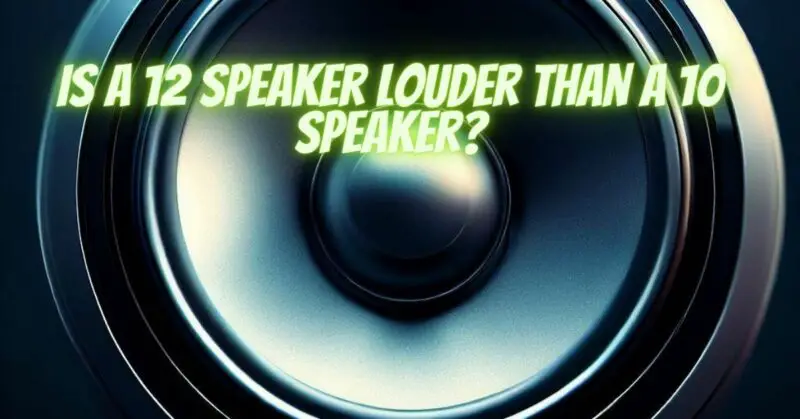When it comes to selecting speakers for your audio system, the choice of speaker size often raises questions about volume and performance. Many wonder if a 12-inch speaker is inherently louder than a 10-inch speaker. In this article, we will delve into the key factors that influence the volume and performance of speakers, helping you make an informed decision when choosing between these two common sizes.
Understanding Speaker Size
Speaker size, typically measured by the diameter of the woofer or driver, is a crucial factor in a speaker’s design. However, it is essential to note that size alone does not determine a speaker’s performance.
Key Factors Affecting Speaker Volume
Several factors influence the volume and performance of a speaker, regardless of its size:
- Amplification: The power and quality of the amplifier driving the speaker play a significant role in determining its volume. A more powerful amplifier can drive both 10-inch and 12-inch speakers to higher volumes.
- Efficiency: Speaker efficiency, measured in decibels (dB), refers to how effectively a speaker converts input power into sound output. More efficient speakers can produce higher volumes with the same amount of input power.
- Design and Enclosure: The design of the speaker and its enclosure affect how efficiently it radiates sound. Well-designed speakers and enclosures can maximize volume and sound quality.
- Driver Design: The type of driver (e.g., cone, horn, or planar) and its materials (e.g., paper, polypropylene, or aluminum) can impact a speaker’s ability to reproduce sound at different frequencies and volumes.
12-Inch vs. 10-Inch Speakers
Now, let’s specifically compare 12-inch and 10-inch speakers:
- Surface Area: A 12-inch speaker has a larger surface area than a 10-inch speaker. This can potentially move more air, allowing for increased volume. However, this advantage primarily applies when both speakers are driven at their maximum capabilities.
- Bass Response: Due to their larger size, 12-inch speakers may have an advantage in producing lower frequencies (bass) with more authority compared to 10-inch speakers. This can contribute to a perception of greater volume in music genres with prominent bass elements.
- Efficiency: Efficiency varies among speakers, regardless of size. Some 10-inch speakers can be more efficient than certain 12-inch models, resulting in higher volume levels for the same input power.
- Purpose and Application: Consider the intended use of the speakers. For applications where size and portability are crucial, 10-inch speakers may be preferred. For larger spaces or situations demanding powerful bass, 12-inch speakers could be a better fit.
In the debate of 12-inch vs. 10-inch speakers, it’s essential to recognize that neither size is inherently louder. A speaker’s volume and performance depend on various factors, including amplification, efficiency, design, and enclosure. While a 12-inch speaker may have advantages in bass response, a well-designed 10-inch speaker can still deliver impressive volume and sound quality.
When choosing between these two sizes, consider your specific needs, listening preferences, and the type of music you’ll be playing. Additionally, it’s essential to audition speakers and assess their performance in your intended environment to make an informed decision based on your unique requirements.

